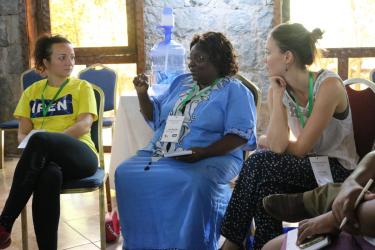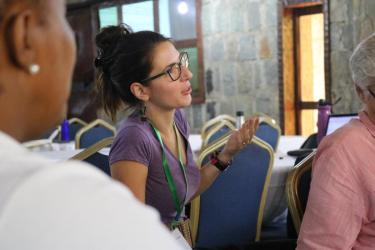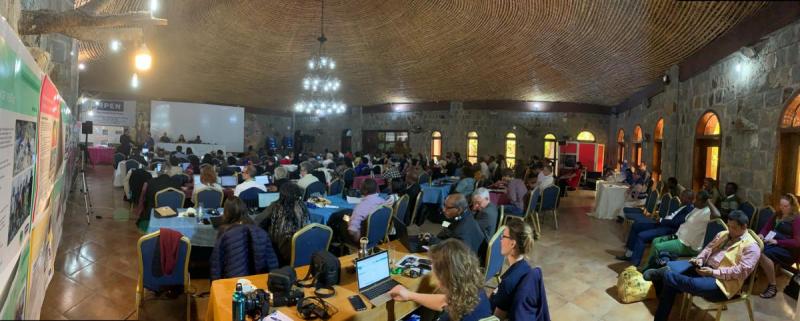IPEN 2020 Global Meeting
IPEN’s 2020 Global Meeting & Forum took place in Bishoftu, Ethiopia, from the 6th – 10th of February. More than 100 environmental, health, and human rights leaders from over 50 countries came together to share the work they do locally and globally to ensure a just and healthy future for everyone by eliminating harm to human health and the environment from toxic chemicals.
The Global Meeting, which was conducted simultaneously in English and French, focused on global networking, policies, skillsharing, trainings, and sharing with participants the outcomes of IPEN’s 2020 Plan. The objectives were to:
- Strengthen the Toxics-Free Future Global Movement: Build and deepen relationships among IPEN Participating Organizations and allies working on chemicals & waste issues.
- Learn from Each Other and Share Skills: Elevate awareness about and capacity on toxics issues via learning from each other and sharing skills / experiences on IPEN priorities.
- Promote Organizational Capacity-Building & Development: Conduct practical and technical trainings on several of the following issues: toxic impacts on health; generating data/monitoring; communication/message framing; organizational management/planning; fundraising; and international policy processes.
- Celebrate Achievements: Acknowledge collective and organizational achievements.
- Reflect on the Evolving Global and National Policy Landscapes: Key speakers will share their local, national or global perspectives about how the world has shifted dramatically since IPEN’s last global meeting in November 2016.
- Strategize around IPEN’s 2030 Goals & Program: Reflect on the IPEN 2020 Plan, and organize around the IPEN 2030 Global Plan, with the aim to guide future technical and financial resources to strategic initiatives.
- Elevate the Profile of Chemicals & Waste Issues: During the IPEN Global Forum on Chemicals and Waste, international and national leaders from governments, UN agencies, civil society organizations and other institutions will share their outlooks about the future actions needed to address the rapid growth and impact of the chemicals and fossil fuel economy, as well as public and political engagement.
Throughout the meeting, a special poster exhibition provided the opportunity for all participants to present their work. Posters related to the IPEN priority themes of:
- Reducing and Eliminating the World’s Most Hazardous Chemicals: Stockholm and Basel Conventions
- Halting the Spread of Toxic Metals: Lead and Mercury
- Addressing Emerging International Chemical Issues, Policies & Strategies: SAICM Beyond 2020 Chemicals/Waste Global Policy Regime, plus emerging cross-cutting areas for exploration (Toxics & Fossil Fuels; Fisheries/ Ocean Pollutants; Plastic; Gender Equality)
- Building the Capacity of the Global Movement: Skill-sharing, strategic partnerships, outreach and organizational/technical/policy trainings
During breaks specifically scheduled to view the posters, participants had a chance to look at them and learn more about their colleagues’ work.
Program Overview
06 February
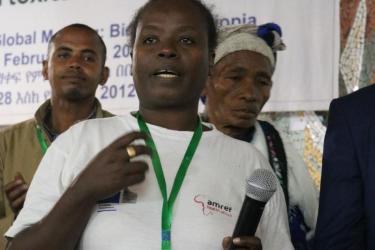
The meeting started with the IPEN Global Forum on Chemicals and Waste. After a welcome from IPEN Co-Chairs Pamela Miller and Tadesse Amera, as well as from the Ethiopian Advisor to the Deputy Commissioner of Environment Forest and Climate Change Commission, Ms. Tayech Ourgicho, the 100 people in attendance heard a compelling story of local Ethiopian cotton farmers who, having dealt with negative health consequences from highly hazardous pesticide use, switched to integrated pest management (IPM) techniques to improve health, achieve greater crop yields, and garner higher prices for their superior quality cotton at market. At the break, there was a demonstration of traditional cotton yarn spinning.
The morning continued with an update on IPEN's work since the last global meeting in 2016, including key issues such as chemical safety and health among workers, illegal export and dumping of toxic wastes around the world and efforts to return wastes to their sources, lead in paint and other products in Africa, and the continuing problem of toxic flame retardants being re-used in new plastic products. In the afternoon sessions, the group heard perspectives about future trends in chemicals-related issues around the world via a panel comprised of IPEN Participating Organization representatives from Jamaica and Indonesia, and Ambassadors from Uruguay and Sweden.
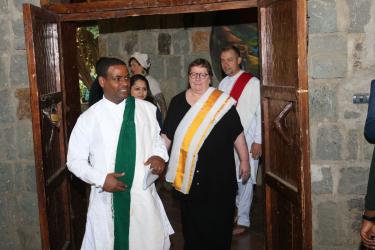
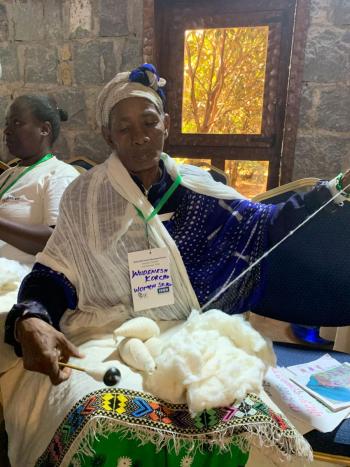
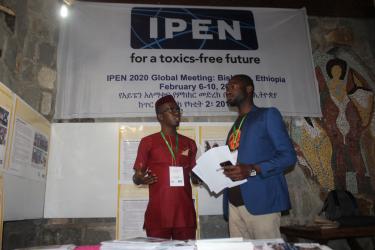
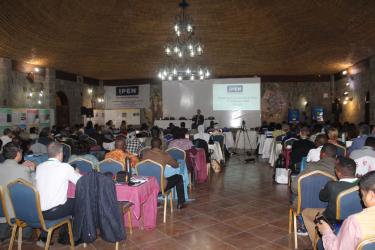
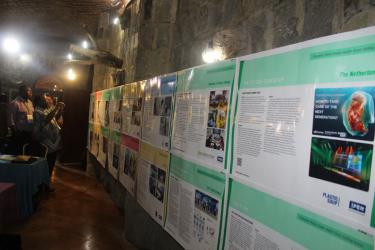
07 February
The day began with an overview of IPEN and its inner workings. Meeting participants learned how IPEN creates and funds projects, how POs can engage with IPEN and its Regional Hubs, and how members of the network can receive technical support from IPEN. Following this, there were break-out skillshare sessions on IPEN key program areas.
After the break out groups, attendees heard from two reporters on how to better engage with media—to understand what different media outlets are looking for, how to work better with individual reporters, how to get reporters to take an interest in a specific story, and how to continue engagement with media throughout the span of a project or campaign.
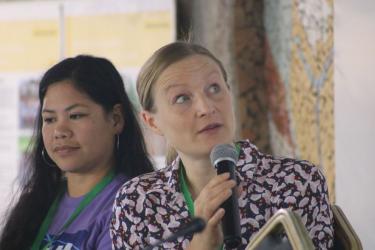
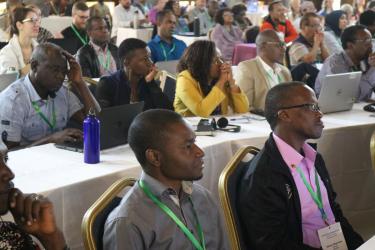
The afternoon sessions consisted of more technical discussions by two doctors, one on endocrine disrupting chemicals (EDCs), and one on the continued, negative health effects of DDT use for malaria control in South Africa. Then, several presentations on the life-cycle of plastic — the extraction of fossil fuels, the chemical additives in plastics, plastics recycling, plastics waste trade, and the incineration of plastic waste — showed their toxic impacts at each stage and their impacts on communities, local, and global.
In the evening, guests were treated to a celebration of Ethiopian culture, with food, music, and dancing.
08 February
International policy was the focus for day three, with discussions of the global policy landscape today, how IPEN is working to globalize local voices and priorities, and an overview of key international policy venues where IPEN is advancing its mission. The audience heard reports on Persistent Organic Pollutants (POPs) and the Stockholm Convention that regulates their use and trade; stricter international controls on waste trade addressed by the recently enacted Basel Ban Amendment within the Basel Convention; and global mercury use and trade and the Minamata Convention on Mercury; as well as efforts to create a new convention on plastics.
The afternoon pivoted to other important policy issues not yet addressed, such as the many additional toxic chemical issues within the SAICM framework, and gender equality and women in leadership in the global policy arena. A discussion about highly toxic PFAS in fire-fighting foams and pesticides was also held. The session concluded with skillshares on these and other issues, giving participants an opportunity to learn from their colleagues about effective ways to address policy at the local, national, and international levels.
09 February
Planning for the next ten years was the focus of day four. The group heard a roadmap of the day's break-out sessions, followed by presentations on strategies NGOs will need to address the flood of plastics anticipated, as the petro-chemical industry plans for increased production of plastics, and all of the toxic chemicals that are used in their production. Afternoon break-out sessions focused on gathering information from participants about how IPEN should structure its work—related to the Basel and Stockholm Conventions, toxic metals and the Mercury Treaty, SAICM, cross-cutting issues (gender, aquatic pollution, SDGs), capacity-building, and the toxic plastics life-cycle—to create its 2030 plan. The day concluded with report-backs from the chairs of the various break-out sessions.
10 February
On the final day of the meeting, attendees heard presentations on improving communication through better stories and images, and then met in break-out groups for several capacity-building training sessions. Among other things, members learned about financial management, online tools, communication strategies, fundraising, data collection, and, in a session with the most "buzz", drone training. The afternoon concluded with opportunities for IPEN members to connect and closing remarks of thanks to host PAN Ethiopia, who worked hard to make the meeting a success.
